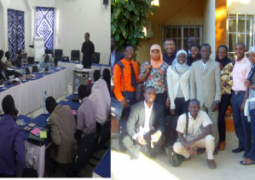A daylong national workshop on networking of food safety, animal and plant health-related lab, organised by the National Codex Committee, with funding from the World Food Programme ended last Tuesday, at the National Nutrition Agency.
Addressing the participants at the opening ceremony, a representative of FAO, Londa Vander Wal, a Consultant said that laboratories are key components of an effective food safety, animal and plant health control system to verify that food products meet standards, and to ensure that animal and plants remain healthy.
"In order for countries such as The Gambia to export to certain markets, reliable and accredited labotorary result must be provided to the importing country. In fact, these analytical results may be used as legal evidences in a court of law to determine compliance with regulations or standards of particularly country," FAO consultant stated.
According to her, the National Codex Sanitary and Phytosanitary Committee recognises the importance of the subject, and thus includes it in its 2009-13 strategic plan, which was further developed through the first phase of an FAO project.
The second phase of the project, he added, is being implemented through the NCSPC committee and includes a training programme for food safety, animal and plants health laboratory technicians.
She said the training programme strongly calls for the development of a network of laboratories and laboratory technicians in the country to improve their efficiency and effectiveness.
For his part, Dr. Babou Jobe, the Director General of NARI, congratulated the FAO, the West Africa Quality Programme, National Codex, Sanitary and Phytosanitary Committee for their enormous contributions towards building effective food safety, animal and plant health systems, which he said, are important to The Gambia.
NARI's Director said the retreat would ensure food and nutrition security by providing safe food for the growing international marketplace.



